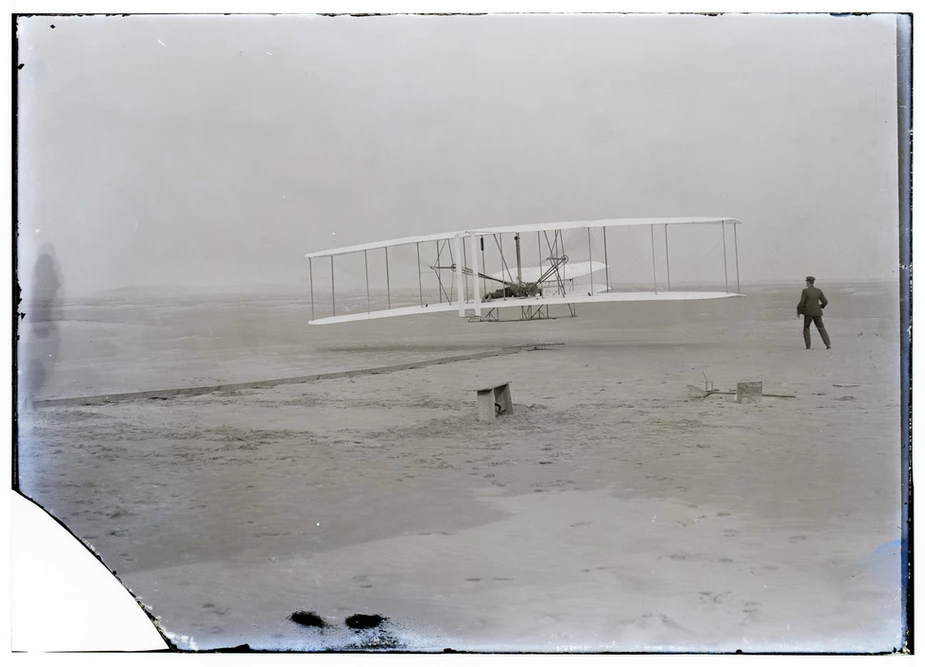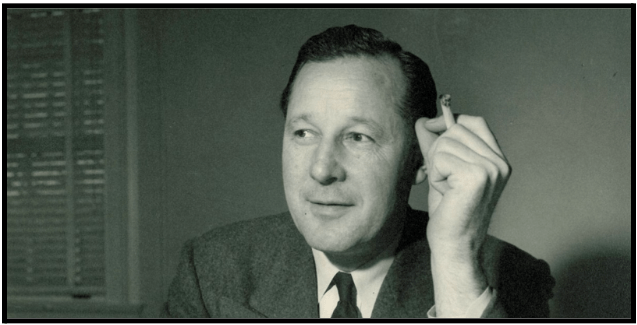Talking Big Ideas.
“Build a new model that makes the existing model obsolete.”
~ Buckminster Fuller
The world changed on December 17.
Two high school dropouts were standing together on a beach. One was missing his front teeth. The young men were partners. Eager to make money, they started a little bike shop to profit off the cycling craze sweeping the country.
The knowledge they gained from bikes made them wonder if they could build something that had never been built before. A device that would realize the dreams of humans since the dawn of time.
A flying machine that people could ride through the air.
They knew that most experts believed human flight was a fantasy. Lord Kelvin, among the most revered scientists of their time, had recently written that “heavier-than-air flying machines are impossible.”
The dropouts were also aware that several celebrated engineers were working hard trying to build their own flying machines. And having no success.
But the young men were convinced they stumbled upon a secret the world’s top scientists and engineers all missed. A secret they uncovered by knowing how people ride bicycles.
They built their flying machine different from any other. It moved and steered like a bike.
And it worked.
Their first flight, on a beach in North Carolina, was captured in a photograph that would go viral worldwide.
Against seemingly impossible odds, two amateur bicycle makers with no formal education or financial support ushered in the era of human flight.
They were brothers named Orville and Wilbur Wright. For years they heard that “it can’t be done.” And for years the naysayers were right.
Until December 17th, 1903.
It was the latest incident in a rich history of supposed experts saying “it can’t be done.” The Boston Post once editorialized that “it is impossible to transmit the voice over wires.” And when it happened, an internal memo at Western Union clarified that “this ‘telephone’ has too many shortcomings to be seriously considered as a practical form of communication.”
The head of 20th Century-Fox was convinced TV “won’t be able to hold on to any market it captures after the first six months. People will soon get tired of staring at a plywood box every night.”
Albert Einstein wrote in 1932 that “there is not the slightest indication that [nuclear energy] will ever be obtainable.”
My favorite is Dr. Dionysus Lardner from University College London, who wrote that “Men might as well project a voyage to the Moon as attempt to employ steam navigation against the stormy North Atlantic Ocean.” Steamships would shortly cross the Atlantic – and the following century astronauts succeeded in that voyage to the moon.
Even Wilbur Wright later admitted he was skeptical about human flight:
I confess that in 1901 I said to my brother Orville that man would not fly for fifty years. Two years later we ourselves made flights.
The truth is the world changes all the time.
Trends extrapolated into the future are often wrong because they don’t account for creativity, innovation, and the unexpected.
The philosopher Bertrand Russell had a famous analogy about turkeys on the family farm. They are well fed and happy. They lead idyllic lives. And then they get slaughtered for holiday dinners.

Russell’s point is that the past does not always predict the future. This applies to technological progress as well as individual skill development.
Basketball star Bob Love stuttered so bad he couldn’t speak at all during media interviews. It was a lifelong affliction. Until he committed to change. Love fixed his stutter and went on to become the corporate spokesperson for Nordstrom. And a celebrated motivational speaker.
My client Tracie used to go out of her way to avoid public speaking. And then she decided to embrace it. Now she can walk on stage without notes and capture the audience’s attention with ease.
My friend Ben is an award-winning public speaker. But as a kid he was so shy he got bullied at school. He remained closed off for years. A teacher encouraged him to speak up. Ben says that his world changed that day.
When has the world changed for you?
This is the moment you realize that you are not imprisoned by who you were yesterday. That you can change the stories you tell yourself about yourself.
You can create the future you want.
Just as the Wright Brothers did on this day in 1903.
***
![]() IDEA
IDEA
The impossible dream of today may be the reality of tomorrow.
What is one negative idea you hold about your communication abilities? Perhaps you tell yourself that you’re not a natural at public speaking. Or you’re bad at listening. Or you’re too introverted or shy to succeed at networking events.
Take a moment and imagine yourself overcoming this obstacle. Flipping it from a weakness into a strength. Picture yourself in 2022 successfully using this strength.
***
If you find this useful, please subscribe to our free weekly newsletter.




